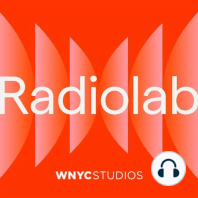59 min listen
Little Black Holes Everywhere
FromRadiolab
ratings:
Length:
35 minutes
Released:
Jul 28, 2023
Format:
Podcast episode
Description
In 1908, on a sunny, clear, quiet morning in Siberia, witnesses recall seeing a blinding light streak across the sky, and then … the earth shook, a forest was flattened, fish were thrown from streams, and roofs were blown off houses. The “Tunguska event,” as it came to be known, was one of the largest extraterrestrial impact events in Earth’s history. But what kind of impact – what exactly struck the earth in the middle of Siberia? – is still up for debate. Producer Annie McEwen dives into one idea that suggests a culprit so mysterious, so powerful, so … tiny, you won’t believe your ears. And stranger still, it may be in you right now. Or, according to Senior Correspondent Molly Webster, it could be You.EPISODE CREDITS Reported by - Annie McEwen and Molly WebsterProduced by - Annie McEwen and Becca Bresslerwith help from - Matt KieltyOriginal music and sound design contributed by - Jeremy Bloom, Annie McEwen, Matt KieltyMixing by - Jeremy Bloomwith dialogue mixing by - Arianne WackFact-checking by - Diane Kellyand edited by - Alex Neason
GUESTS Matt O’Dowd (https://www.mattodowd.space/)Special Thanks:
Special thanks to, Matthew E. Caplan, Brian Greene, Priyamvada Natarajan, Almog Yalinewich
CITATIONS:
Please put any supporting materials you think our audience would find interesting or useful below in the appropriate broad categories.
Videos: Watch “PBS Space Time,” (https://zpr.io/GNhVAWDday49) the groovy show and side-gig of physicist and episode guest Matt O’Dowd
Articles: Read more (https://zpr.io/J4cKYG5uTgNf) about the Tunguska impact event! Check out the paper (https://zpr.io/vZxkKtGQczBL), which considers the shape of the crater a primordial black hole would make, should it hit earth: “Crater Morphology of Primordial Black Hole Impacts”Curious to learn more about black holes possibly being dark matter? You can in the paper (https://zpr.io/sPpuSwhGFkDJ), “Exploring the high-redshift PBH- ΛCDM Universe: early black hole seeding, the first stars and cosmic radiation backgrounds”
Books:
Get your glow on – Senior Correspondent Molly Webster has a new kids book, a fictional tale about a lonely Little Black Hole (https://zpr.io/e8EKrM7YF32T)Our newsletter comes out every Wednesday. It includes short essays, recommendations, and details about other ways to interact with the show. Sign up (https://radiolab.org/newsletter)!
Radiolab is supported by listeners like you. Support Radiolab by becoming a member of The Lab (https://members.radiolab.org/) today.
Follow our show on Instagram, Twitter and Facebook @radiolab, and share your thoughts with us by emailing radiolab@wnyc.org.
Leadership support for Radiolab’s science programming is provided by the Gordon and Betty Moore Foundation, Science Sandbox, a Simons Foundation Initiative, and the John Templeton Foundation. Foundational support for Radiolab was provided by the Alfred P. Sloan Foundation.
GUESTS Matt O’Dowd (https://www.mattodowd.space/)Special Thanks:
Special thanks to, Matthew E. Caplan, Brian Greene, Priyamvada Natarajan, Almog Yalinewich
CITATIONS:
Please put any supporting materials you think our audience would find interesting or useful below in the appropriate broad categories.
Videos: Watch “PBS Space Time,” (https://zpr.io/GNhVAWDday49) the groovy show and side-gig of physicist and episode guest Matt O’Dowd
Articles: Read more (https://zpr.io/J4cKYG5uTgNf) about the Tunguska impact event! Check out the paper (https://zpr.io/vZxkKtGQczBL), which considers the shape of the crater a primordial black hole would make, should it hit earth: “Crater Morphology of Primordial Black Hole Impacts”Curious to learn more about black holes possibly being dark matter? You can in the paper (https://zpr.io/sPpuSwhGFkDJ), “Exploring the high-redshift PBH- ΛCDM Universe: early black hole seeding, the first stars and cosmic radiation backgrounds”
Books:
Get your glow on – Senior Correspondent Molly Webster has a new kids book, a fictional tale about a lonely Little Black Hole (https://zpr.io/e8EKrM7YF32T)Our newsletter comes out every Wednesday. It includes short essays, recommendations, and details about other ways to interact with the show. Sign up (https://radiolab.org/newsletter)!
Radiolab is supported by listeners like you. Support Radiolab by becoming a member of The Lab (https://members.radiolab.org/) today.
Follow our show on Instagram, Twitter and Facebook @radiolab, and share your thoughts with us by emailing radiolab@wnyc.org.
Leadership support for Radiolab’s science programming is provided by the Gordon and Betty Moore Foundation, Science Sandbox, a Simons Foundation Initiative, and the John Templeton Foundation. Foundational support for Radiolab was provided by the Alfred P. Sloan Foundation.
Released:
Jul 28, 2023
Format:
Podcast episode
Titles in the series (100)
Animal Minds: In this hour of Radiolab, stories of cross-species communication. When we gaze into the eyes of a wild animal, or even a beloved pet, can we ever really know what they might be thinking? Is it naive to assume they're experiencing something close to human emotions? Or is it ridiculous to assume that they AREN'T feeling something like that? We get the story of a rescued whale that may have found a way to say thanks, ask whether dogs feel guilt, and wonder if a successful predator may have fallen in love with a photographer. by Radiolab
